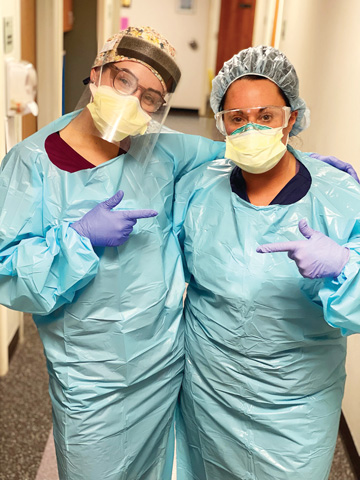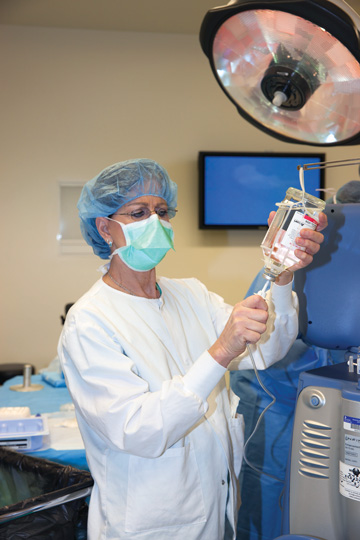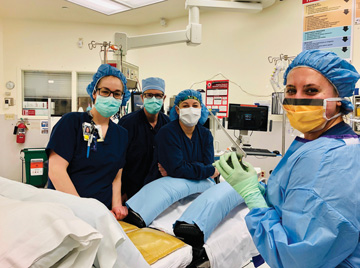Widespread staffing shortages will continue for the foreseeable future because the workplace stresses caused by the pandemic have forced many older nurses to opt for early retirement and many younger nurses are deciding to leave health
care altogether for the relative calm of another career. There simply aren’t enough nurses in the pipeline to fill the positions vacated by those who are fleeing the profession. Enter travel nurses, whose ranks are increasing with an
inflow of former full-time nurses. Healthcare leaders are taking notice and putting plans in place to stem the tide.
Ms. Harris says a former traveler who is now on permanent staff at a hospital in Alabama has been offered a short-term contract that would pay her the same higher rate as the travel nurses she works with. When the contract expires, her pay will
revert to her lower base salary. Another hospital with which Ms. Harris has connections is increasing the hourly rate of its OR staff by $10 an hour to entice them to stay.
To attract and retain highly skilled nurses and surgical technologists to its workforce, the University of Pittsburgh Medical Center (UPMC) created an in-house travel staffing agency, believed to be the first of its kind in the country. UPMC will
offer travel nurses $85 an hour and surgical technicians $63 an hour, as well as travel allowances given each time they begin new assignments, a sum that equates to $2,880 every six weeks. Nurses and techs who are accepted into the program
earn a comparable wage to what travelers earn at outside agencies.
UPMC created the program with the goal of relying less on outside agencies to fill open positions and to encourage its employees to work in the health system’s hospitals across Pennsylvania, Maryland and New York — wherever and whenever
the need is greatest. The program, which launched at the end of 2021, will provide needed staffing support to the system’s frontline caregivers and additional career opportunities for UPMC nurses and surgical technologists.
The health system’s leadership developed the in-house staffing agency after listening to the staff’s needs and challenges. “They’ve been through this pandemic for almost two years, and it’s been quite the high burden
for them to see so much illness,” says John Galley, BS, MBA, senior vice president and chief human resources officer at UPMC. “They’re asking for help and solutions.”
UPMC has been losing nurses to outside travel agencies, and its nursing staff turnover rate has doubled in recent months, according to Holly Lorenz, RN, MSN, chief nurse executive of UPMC’s Center for Nursing Excellence. “We’re
seeing rates we’ve never seen before,” says Ms. Lorenz. “We believe that’s driven by some of the incredibly high agency rates that are out there. We’re creating a competitive rate matched with what we believe
is a best benefit package and a preferred place to work.”
The in-house staffing agency is a way for UPMC to reconnect with nurses who have left for outside agencies and bring them back into the fold, points out Mr. Galley, who adds, “It gives our employees a career choice, which is something they’re
seeking.”
The program also makes good financial sense for UPMC. Pre-pandemic, says Mr. Galley, the health system could hire an agency travel nurse for $85 an hour, and the nurse would take home about $50 of the fee. He’s now seeing rates between $200
and $280, which means the nurses are making about $90 per hour. The agencies are collecting the difference, which has more than tripled in some cases.
“That’s profiteering on the pandemic,” says Mr. Galley. “This is a way for us to restore some balance to the equation.”
UPMC is aiming to eventually recruit 800 nurses into the program, but Mr. Galley concedes that will take time. “This is a short-term solution,” he says. “It’s not going to fix everything, but we think there’s a place
for it. We’re also working on long-term efforts to grow the pipeline of new nurses.”
Mr. Galley believes the program will be needed to combat a nursing shortage he expects to last at least a couple more years. “Offering workers the same choices that are in the market is what needs to be done,” he says. “We must
be creative and thoughtful in developing innovative staffing solutions.”
Surgery centers are also feeling the downstream effects of the nursing shortage. Advanced Eye Surgery and Laser Center in Gainesville, Ga., is dealing with staffing shortages but does not employ travel nurses, according to Surgical Manager Gail
Forrester, MSNEd, RN. Most of the facility’s nursing staff are per diem employees who work only when the center’s surgeons perform surgery, which averages out to five days per month. “It’s hard to find staff who want
to work this limited schedule,” she says.
Most of the center’s nurses also hold full-time positions at the local hospital. “As the hospital’s COVID cases increase, so does the hourly pay for nurses who agree to work overtime shifts,” says Ms. Forrester. The ophthalmic
ASC does not match the hourly rates the hospital pays full- or part-time nurses, and this pay disparity can create acute issues on any given surgery day.
“The nurses will call out at our ASC to work a higher-paying job,” she says. “Because our practice is small, we cannot compete with these high salaries. My only hope is to find nurses who want to work two days a week and are
willing to take the hourly salary.”
Another issue at play, she notes, is the fact that PRN positions do not offer benefits. Because the salaries offered at Advanced Eye are comparable to those offered at other area ASCs, Ms. Forrester delivers a pragmatic message to local nurses
who, despite the pay disparity, still would prefer not to work at a hospital. “We have suggested that they take two PRN jobs at two separate ASCs so they can get more hours per week,” she says.
Brian Bizub, BSHA, executive director and CEO at Raleigh (N.C.) Orthopaedic Clinic, finds his facility in a much busier situation. His ASC is riding the wave of outpatient total joints procedures, of which it is performing more than ever before.
Maintaining such a constant, brisk volume has been challenging given the staffing crisis. Last year during the fall — as at many ASCs, the busiest time of year because of patients’ deductibles — his facility filled in staffing
gaps with per-diem nurses.
Market forces, says Mr. Bizub, are making it very difficult to get — and remain — fully staffed. He says local traveling nurses often receive $20 more per hour than his ASC offers; two of his nurses have left to become local travelers.
Another factor, he says, is that insurance companies are hiring nurses for work-at-home jobs. “For people who have children and a $1,000 daycare bill, being able to work from home fits their lifestyle,” he says. “The market
supports that.”
Mr. Bizub has heard about incredible pay packages being offered to travelers. One offer to nurses for interim ASC work particularly stood out, involving about $4,000 a week, a $3,000 traveling stipend, and $3,000 in car and living expenses. He
believes some nurses are prepared to ride the high-compensation wave as travelers until the situation settles down, at which time he expects many will return to full-time jobs.
“It’s hard to pass up $4,000 a week,” he says. “I don’t blame them. If I were younger, I’d probably do the exact same thing.”
.svg?sfvrsn=be606e78_3)



.svg?sfvrsn=56b2f850_5)